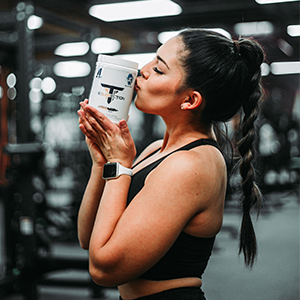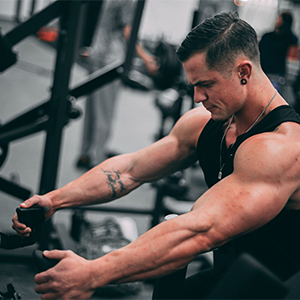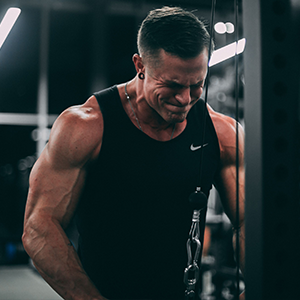
3 Ways to Improve Sleep so You Can Kill it at the Gym
The unsung hero of the weight room isn't lifting heavy, or getting into an anabolic state. Truly, the unsung hero of the weight room is sleep. Sleep is something that modern exercise science is still trying to figure out.
Research shows that individuals who get less than 7 hours of sleep have lower testosterone, tend to have higher body fat ratios, and less muscle mass. Everyone from the elite athlete to average joe will benefit from a good night's rest. That’s why, in this Supplement Xpress blog post, we’re going to take you through three ways to improve sleep so you can kill it at the gym. Let’s get into it.
How to Improve Your Sleep
Look, we’re not going to list the common ways you’ve probably heard of. We all know that if you drink less caffeine during the day, improve your metabolism, and get into the habit of training your sleep will start to improve. At Supplement Xpress we want to provide you, the reader, with a more tailored approach to your health and fitness.
We sat down with our supplement and training experts to talk about how anyone can improve their sleep. Here’s what they came up with:

1. Increase Time and Intensity of Workouts
The first thing everyone needs to do is understand how your training affects your body, specifically, your metabolism. We know that metabolism is a fancy way of determining how your body burns calories (energy) throughout the day, but our supplement and training experts mention that time and intensity are crucial.
The duration of your workout ‒ also known as, how long you workout for, can make a huge difference in your sleep cycles. Longer workouts can help to promote a steady metabolic response, which can help promote deeper and longer sleep.
The intensity can also factor into how well you sleep. Intensity refers to how difficult your workout is. A low intensity might be something like incline treadmill walking, while a higher intensity could be something like a HIIT session at your local CrossFit gym.
Find the right balance between time and intensity and watch as your sleep cycle regulates and finds a natural rhythm. Our suggestion is to use both long duration (time) paired with low-intensity workouts (incline walking), as well as short-duration and high intensity. Both can be extremely valuable.

2. Be Conscious of Pre-Sleep Calories
The quality and quantity of calories you eat in the evening can have a major impact on your sleep. When it comes to calories and sleep, the biggest variables are how fast you fall asleep, and how well you sleep. Research has been conducted on the effect of different foods as they rank on the glycemic index (a scale for how foods change blood sugar levels).
Some research showed that foods with a higher glycemic index (consumed 4 hours before bed) promoted a faster time to sleep (sleep onset latency). While it would be difficult to suggest that the average person should consume high GI foods like potatoes, white rice, and other starches before sleep, we can comfortably say that having quality carbohydrates with your dinner can help with sleep.
Things to consider about pre-sleep calories:
- Pay attention to what you eat before you sleep,
- Understand that everyone's body will react differently to certain foods,
- Try to record what you are eating, have a balanced meal with hearty grains, lean proteins, and moderate fats,
- Don’t go to sleep hungry, and don’t go to sleep stuffed.
Remember: Balance in the quality and quantity of pre-sleep calories will help regulate how fast you sleep and how long you sleep.

3. Hit the Hay with Consistency
Consistency is the king of weight training. Anyone can have one good workout or one good sleep. The main component of any great athlete, bodybuilder, strength athlete, runner ‒ is consistency.
Getting to sleep at the same time every night is crucial. Waking up at around the same time is also an important step to keep your circadian rhythm the same.
Understandably, for those readers who live in northern parts of the world, where the seasons change drastically ‒ this can be challenging. For those of us that live in southern climates with consistent night/day cycles ‒ get to sleep at around the same time every night and wake up at the same time every morning.
This doesn't mean that you cant sleep in from time to time and enjoy the comforts of your bed, but your aim should be a consistent 7-8 hours every night.
Bonus: Supplements to Aid Sleep
Check out our favourite sleep aid supplements.
5% Knocked the F*** out
Packed with amino acids like L-Tyrosine, L-Theanine, and L-Tryptophan, 5% Knocked the F*** Out is a purpose-built sleep aid supplement. While ingredients like Chamomile and Lemon balm help to promote a relaxed and calm feeling, the amino acids go to work internally stimulating sleep cycles.
5% Knocked the F*** Out is finished off with GABA, a non-protein amino acid that acts as an inhibitory neurotransmitter that can promote relaxation.
If you train hard, be sure to consciously optimize your sleep with potent supplements like 5% Knocked the F*** out.
Redcon Fade Out
Redcon Fade Out is another favourite of our supplement coaches because it has a high potency of sleep aids like GABA, L-Theanine, Valerian root, and MACA Pruriens. Fade out also subtly adds a ZMA complex (Zinc, Magnesium, B6) which has been extensively studied as a sleep aid and performance supplement for high-level athletes.
Sleep and Performance
One cannot survive without the other. You can train as hard as you want, but without the proper recovery and sleep patterns, your body won’t be capable of optimal growth.
Be conscious of your workout structure. Keep an eye on time and intensity throughout the week. Watch your pre-sleep calories and be sure to keep your sleep times consistent.
Follow these three rules, supplement intentionally ‒ and watch as your lifts grow, energy levels spike, and caffeine obsession decrease.




Leave a comment